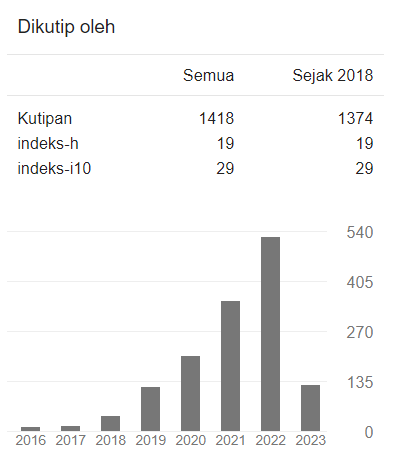Outdoor Learning in Elementary Schools: Utilizing the Surrounding Environment to Increase Student Learning Engagement
DOI:
https://doi.org/10.22219/jp2sd.v12i2.33364Keywords:
Outdoor learning, student engagement, state elementary schoolsAbstract
This research aimed to reveal various reasons that encourage teachers to use outdoor learning, the implementation of outdoor learning in schools, obstacles, and the positive impact of implementing outdoor learning at SDN 2 Tajinan. Researchers employed a descriptive qualitative approach, where data collection was carried out through interviews, observation, and documentation. The research results showed that the reasons teachers use outdoor learning include increasing learning engagement, providing authentic learning experiences, honing skills, and introducing students to the environment. Apart from that, outdoor learning is carried out to connect theory and practice in everyday life, create contextual learning, and develop social skills, problem-solving, and students' curiosity. Outdoor learning is carried out by inviting students to plant plants in the school environment, visiting the Arhanud Education Center in Batu City, and inviting students to get to know the environment around the school. The obstacles faced by teachers are difficulties in conditioning students due to the large number of students and the weather and natural conditions. Apart from that, implementing outdoor learning requires more thorough preparation and tends to take longer than conventional learning. The positive impacts that arise include being able to increase student enthusiasm and involvement in learning, making learning more lively, and increasing students' social-emotional aspects, responsibility, and concern for the environment.
Downloads
References
Antari, C. J., Triyogo, A., & Egok, A. S. (2021). Penerapan Model Outdoor Learning pada Pembelajaran Tematik Siswa di Sekolah Dasar. Jurnal Basicedu, 5(4), 2209–2219. https://doi.org/10.31004/basicedu.v5i4.1165
Ariesandy, K. T. (2021). Pengaruh Pembelajaran Luar Kelas (Outdoor Learning) Berbentuk Jelajah Lingkungan Dan Motivasi Terhadap Hasil Belajar Biologi Siswa. Wahana Matematika Dan Sains: Jurnal Matematika, Sains, Dan Pembelajarannya, 15(1), 110–120.
Ashjae, S., Fattahi, K., & Derakhshanian, F. (2024). Investigating the links between outdoor class and learning in primary school students (case study of a male-school in Shiraz). Journal of Adventure Education and Outdoor Learning, 24(2), 232–248. https://doi.org/10.1080/14729679.2022.2135117
Ayotte-Beaudet, J.-P., Hasni, A., Vinuesa, V., Rodrigue-Poulin, É., Quintela Do Carmo, G., Beaudry, M.-C., L’Heureux, K., & Paquette, A. (2024). Impact of outdoor place-based learning on elementary school students’ ability to make unsolicited observations about living organisms over time. Journal of Biological Education, 1–19. https://doi.org/10.1080/00219266.2024.2332741
Cahyanto, B. (2023). School Culture-Based Character Education: Implementation of Strengthening Religious Character in Islamic Primary Schools. MODELING: Jurnal Program Studi PGMI, 10, 832–843.
Cahyanto, B., Lutfia, M. S., Muawana, N., & Ilmi, I. N. (2021). Teacher Strategies in Online Learning During the Covid-19 Pandemic : A Practice in Elementary School. 262–269.
Cahyanto, B., Maghfirah, M., & Hamidah, N. (2021). Implementasi Pembelajaran Daring di Masa Pandemi Covid-19. At-Thullab: Jurnal Pendidikan Guru Madrasah Ibtidaiyah, 5(1).
Czajka, C. D., & McConnell, D. (2019). The adoption of student-centered teaching materials as a professional development experience for college faculty. International Journal of Science Education, 41(5), 693–711. https://doi.org/10.1080/09500693.2019.1578908
Demirtas, S., & Akkocaoglu Cayır, N. (2021). An Investigation of Elementary School Teachers’ Experiences about Outdoor Education Activities Project. TED EĞİTİM VE BİLİM. https://doi.org/10.15390/EB.2021.9565
Derman, M. (2023). Outdoor Learning in Environmental Education: Evaluation of Science Curriculums. International Conference on Engineering, Natural and Social Sciences, 1(1), 166–171.
Dijk, J. E., Wesselius, Berg, A. E. van den, Maas, J., & Hovinga, D. (2020). Green Schoolyards as Outdoor Learning Environments: Barriers and Solutions as Experienced by Primary School Teachers. Frontiers in Psychology, 10(January), 1–16. https://doi.org/10.3389/fpsyg.2019.02919
Guerra, M., Villa, F., Latinoamericana, V. G.-Rela. R., & 2021, undefined. (2021). Creativity and outdoor education in primary schools: a review of the literature. Revistas.Usc.Es, 10(1), 2255–0666. https://revistas.usc.es/index.php/reladei/article/view/7671
Harris, R., & Bilton, H. (2018). Learning about the past: exploring the opportunities and challenges of using an outdoor learning approach. Cambridge Journal of Education, 49(1), 69–91. https://doi.org/10.1080/0305764X.2018.1442416
Khan, M., Bell, S., McGeown, S., & Silveirinha de Oliveira, E. (2020). Designing an outdoor learning environment for and with a primary school community: a case study in Bangladesh. Landscape Research, 45(1), 95–110. https://doi.org/10.1080/01426397.2019.1569217
Khan, M., McGeown, S., & Bell, S. (2020). Can an Outdoor Learning Environment Improve Children’s Academic Attainment? A Quasi-Experimental Mixed Methods Study in Bangladesh. Environment and Behavior, 52(10), 1079–1104. https://doi.org/10.1177/0013916519860868
Koto, I., & Susanta, A. (2019). Introducing Outdoor Learning in Science and Mathematics to Elementary School Teachers via Professional Development. Proceedings of the International Conference on Educational Sciences and Teacher Profession (ICETeP 2018). https://doi.org/10.2991/icetep-18.2019.69
Kusumastuti, A., & Mustamil, A. K. (2019). Metode Penelitian Kualitatif (F. Annisya & Sukarno (eds.)). Lembaga Pendidikan Sukarno Pressindo.
MacQuarrie, S. (2018). Everyday teaching and outdoor learning: developing an integrated approach to support school-based provision. Education 3-13 International Journal of Primary, Elementary and Early Years Education, 46(3), 345–361. https://doi.org/10.1080/03004279.2016.1263968
Maulana, G. G., & Saputra, J. (2019). Penggunaan Metode Pembelajaran Outdoor Learning untuk Meningkatkan Hasil Belajar Siswa pada SubkonsepVertebrata. BIOSFER : Jurnal Biologi Dan Pendidikan Biologi, 3(1), 30–33. https://doi.org/10.23969/biosfer.v3i2.1263
Meighan, H. L., & Rubenstein, E. D. (2019). Outdoor Learning into Schools: A Synthesis of Literature. Career and Technical Education Research, 43(2), 161–177. https://doi.org/10.5328/cter43.2.161
Miles, M. B., Huberman, A. M., & Saldana, J. (2014). Qualitative Data Analysis: A Methods Sourcebook (Three Edit). SAGE Publications, Inc.
Oberle, E., Zeni, M., Munday, F., & Brussoni, M. (2021a). Support Factors and Barriers for Outdoor Learning in Elementary Schools: A Systemic Perspective. American Journal of Health Education, 52(5), 251–265. https://doi.org/10.1080/19325037.2021.1955232
Oberle, E., Zeni, M., Munday, F., & Brussoni, M. (2021b). Support Factors and Barriers for Outdoor Learning in Elementary Schools: A Systemic Perspective. American Journal of Health Education, 52(5), 251–265. https://doi.org/10.1080/19325037.2021.1955232
Pambudi, D. S. (2022). The Effect of Outdoor Learning Method on Elementary Students’ Motivation and Achievement in Geometry. International Journal of Instruction, 15(1), 747–764. https://doi.org/10.29333/iji.2022.15143a
Pitiporntapin, S., Butkatanyoo, O., Piyapimonsit, C., Thanarachataphoom, T., Chotitham, S., & Lalitpasan, U. (2023). The development of a professional development model focusing on outdoor learning resources to enhance in-service teachers’ STEM literacy. Kasetsart Journal of Social Sciences, 44(2), 489–496. https://doi.org/10.34044/j.kjss.2023.44.2.19
Prasetya, S. P., Segara, N. B., & Imron, A. (2020). Effectiveness Of Outdoor Learning Optimization Program In Learning Social Studies. JPI (Jurnal Pendidikan Indonesia), 9(2), 314. https://doi.org/10.23887/jpi-undiksha.v9i2.19160
Prince, H. E., & Diggory, O. (2023). Recognition and reporting of outdoor learning in primary schools in England. Journal of Adventure Education and Outdoor Learning, 1–13. https://doi.org/10.1080/14729679.2023.2166544
Putri, C. S. (2023). Peran Pembelajaran Berbasis Outdoor dalam Meningkatkan Keterampilan Berpikir Kritis Siswa: Studi Quasi-Eksperimental di Sekolah Menengah Atas di Bandung. Sanskara Pendidikan Dan Pengajaran, 1(2), 68–77. https://doi.org/10.58812/spp.v1i02.113
Rifai, A. Y., Wahid, F. S., Yasin, & Fitri, R. M. (2023). Pengaruh Pendekatan Outdoor Learning terhadap Hasil Belajar Peserta Didik Kelas IV Sekolah Dasar Negeri Losari Kidul 03, Kecamatan Losari, Kabupaten Brebes. Era Literasi: Jurnal Penelitian Pendidikan Dan Ilmu Sosial, 1(3), 15–30. https://jurnal.eraliterasi.com/index.php/eraliterasi/article/view/87%0Ahttps://jurnal.eraliterasi.com/index.php/eraliterasi/article/download/87/73
Rini, T. A., & Cahyanto, B. (2020). Supporting Elementary Students Creative Writing Skill With Assessment as Learning. 487(Ecpe), 51–57. https://doi.org/10.2991/assehr.k.201112.010
Sajjad, A. M. (2022). Implementasi Strategi Pembelajaran Outdoor Learning dalam Mata Pelajaran IPS di MI Sabilul Muttaqin Bungkal. Islamic Elementary School: Journal of Education, 2(2), 1–25.
Slee, V., & Allan, J. F. (2019). Purposeful Outdoor Learning Empowers Children to Deal with School Transitions. Sports, 7(6), 1–14. https://doi.org/10.3390/sports7060134
Tao, Y., Meng, Y., Gao, Z., & Yang, X. (2022). Perceived teacher support, student engagement, and academic achievement: a meta-analysis. Educational Psychology, 42(4), 401–420. https://doi.org/10.1080/01443410.2022.2033168
Taylor, S. J., Bogdan, R., & DeVault, M. L. (2016). Introduction to Qualitative Research Methods: A Guidebook and Resource. In News.Ge (Fourth Edi). John Wiley & Sons, Inc.
Thornberg, R., Forsberg, C., Hammar Chiriac, E., & Bjereld, Y. (2022). Teacher–Student Relationship Quality and Student Engagement: A Sequential Explanatory Mixed-Methods Study. Research Papers in Education, 37(6), 840–859. https://doi.org/10.1080/02671522.2020.1864772
Tibe, A. M., Yanti, R., & Jamaluddin, N. E. (2023). Analisis Efektivitas Penggunaan Metode Outdoor Learning dalam Meningkatkan Hasil Belajar Siswa (Studi Kasus: MTs As’Adiyah No . 45 Lonra Kabupaten Wajo). INNOVATIVE: Journal Of Social Research, 3(1), 769–781.
Waite, S. (2009). Outdoor learning for children aged 2-11: perceived barriers, potential solutions. International Outdoor Education Research Conference, La Trobe University, Beechworth, Victoria, Australia, 4(1), 1–12. https://www.researchgate.net/publication/242494391
Williams, R. T., & Scott, C. D. (2019). The Current State of Outdoor Learning in a U.K Secondary Setting: Exploring the Benefits, Drawbacks and Recommendations. ABC Journal of Advanced Research, 8(2), 109–122. https://doi.org/10.18034/abcjar.v8i2.537
Yokus, G. (2020). Integrating Outdoor School Learning Into Formal Curriculum: Designing Outdoor Learning Experiences and Developing Outdoor Learning Framework for Pre-Services Teachers. Encyclopedia of Teacher Education, 5(13), 1380–1380.
Zapata-Cuervo, N., Montes-Guerra, M. I., Shin, H. H., Jeong, M., & Cho, M. H. (2021). Students’ Psychological Perceptions Toward Online Learning Engagement and Outcomes during the COVID-19 Pandemic: A Comparative Analysis of Students in Three Different Countries. Journal of Hospitality and Tourism Education, 00(00), 1–15. https://doi.org/10.1080/10963758.2021.1907195
Zuhaida, K., & Kinesti, R. D. A. (2023). Teacher Creativity in Implementing Indonesian Language Learning Using Cursive Letter Writing. MUDARRISA: Jurnal Kajian Pendidikan Islam, 15(2), 196–214. https://doi.org/10.18326/mudarrisa.v15i2.278
Zulvikar, M., Azis, S. A., & Pasiri, Y. (2023). Pengaruh Metode Outdoor Learning Terhadap Keterampilan Menulis Karangan Deskripsi Kelas IV SDN 135 Palae. Education, Language, and Culture (EDULEC), 3(3), 267–277.
Downloads
Published
Issue
Section
License
Copyright (c) 2024 Bagus Cahyanto, Qita Riambada Tsurayya Dewi, Ella Oktaviani; Titis Angga Rini, Nindya Nurdianasari, Hairus Saleh

This work is licensed under a Creative Commons Attribution-ShareAlike 4.0 International License.
Authors who publish with Jurnal Pemikiran dan Pengembangan Sekolah Dasar (JP2SD) agree to the following terms:
- For all articles published in Jurnal Pemikiran dan Pengembangan Sekolah Dasar (JP2SD), copyright is retained by the authors. Authors give permission to the publisher to announce the work with conditions. When the manuscript is accepted for publication, the authors agree to automatic transfer of the publishing right to the publisher.
- Authors retain copyright and grant the journal right of first publication with the work simultaneously licensed under a Creative Commons Attribution-ShareAlike 4.0 International License that allows others to share the work with an acknowledgment of the work's authorship and initial publication in this journal.
- Authors are able to enter into separate, additional contractual arrangements for the non-exclusive distribution of the journal's published version of the work (e.g., post it to an institutional repository or publish it in a book), with an acknowledgment of its initial publication in this journal.
- Authors are permitted and encouraged to post their work online (e.g., in institutional repositories or on their website) prior to and during the submission process, as it can lead to productive exchanges, as well as earlier and greater citation of published work (See The Effect of Open Access).

This work is licensed under a Creative Commons Attribution-ShareAlike 4.0 International License.


















